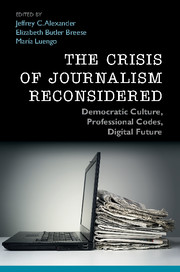Book contents
- Frontmatter
- Dedication
- Contents
- About the Contributors
- Preface
- Acknowledgments
- Introduction: Journalism, democratic culture, and creative reconstruction
- PART I THE CRISIS NARRATIVE
- PART II FEARS OF DIGITAL NEWS MEDIA: THE SYMBOLIC STRUGGLE
- 6 When codes collide: Journalists push back against digital desecration
- 7 Telling the crisis story of journalism: Narratives of normative reassurance in Page One
- 8 Assembling publics, assembling routines, assembling values: Journalistic self-conception and the crisis in journalism
- 9 The constancy of immediacy: From printing press to digital age
- 10 News on new platforms: Norwegian journalists face the digital age
- PART III PROFESSIONAL JOURNALISM, CIVIL CODES, AND DIGITAL CULTURE
- Conclusion: News innovations and enduring commitments
- Index
- References
6 - When codes collide: Journalists push back against digital desecration
from PART II - FEARS OF DIGITAL NEWS MEDIA: THE SYMBOLIC STRUGGLE
Published online by Cambridge University Press: 05 June 2016
- Frontmatter
- Dedication
- Contents
- About the Contributors
- Preface
- Acknowledgments
- Introduction: Journalism, democratic culture, and creative reconstruction
- PART I THE CRISIS NARRATIVE
- PART II FEARS OF DIGITAL NEWS MEDIA: THE SYMBOLIC STRUGGLE
- 6 When codes collide: Journalists push back against digital desecration
- 7 Telling the crisis story of journalism: Narratives of normative reassurance in Page One
- 8 Assembling publics, assembling routines, assembling values: Journalistic self-conception and the crisis in journalism
- 9 The constancy of immediacy: From printing press to digital age
- 10 News on new platforms: Norwegian journalists face the digital age
- PART III PROFESSIONAL JOURNALISM, CIVIL CODES, AND DIGITAL CULTURE
- Conclusion: News innovations and enduring commitments
- Index
- References
Summary
INTRODUCTION
In May 2012, Advance Publications, the Newhouse family publisher of the New Orleans-based The Times-Picayune, announced a drastic contraction of the newspaper's print edition and the extraordinary expansion of its Website, which was to become a platform for 24-hour online news. Controversial staff cuts followed the announcement. Yet another American newspaper faced severe reductions in staff and the looming prospect that the merger of print and digital operations would undermine the independence of the traditional newsroom. Remarkably, there was an immediate public outcry – locally, nationally, and even globally – that strongly polluted the imminent changes as anti-democratic. “A symbol of the courageous resistance of New Orleans during Hurricane Katrina and its aftermath, has bowed to the market pressures of modern press,” read the opening sentence of an article in The New York Times on May 25, 2012.
The civil significance of impending changes in The Times-Picayune was confirmed by mobilizations across urban social networks in New Orleans, public demonstrations on behalf of the newspaper, and a statement signed by the newly formed “Times-Picayune Citizens Group” of influential citizens. In national and local news reports, columns, feature stories, and blogs, the emerging crisis was narrated as a conflict between civil and anti-civil social forces. Advance executives were depicted as constructing the new digital platform so new production could be reoriented to maximize profit and prurient titillation. Yet, this very coding pushed not only local but national social forces to find ways to defend the sacred ethical community of journalism and its vital relation to the “polis” of New Orleans. Many reporters were rehired, editors made fervent public declarations about maintaining professional standards of investigative reporting and independence, and a “cowboy” version of the paper soon became distributed on its digital-only days.
Forced digital transitions, downsizings, and closures have been the familiar storyline of contemporary newspapers in America (Downie and Schudson 2009; Chyi, Lewis & Zheng 2012) and the Western world since 2008 (OECD 2010; Pew Research Center 2013); but not all have generated the responses that The Times-Picayune stirred. When two large US dailies, the Rocky Mountain News and the Seattle Post-Intelligencer, collapsed in early 2009 in quick succession, and gloomy predictions on the future of newspapers (Starr 2009) began to appear, there was no public outcry in Denver and Seattle (Carlson 2011) in contrast to New Orleans in 2012.
- Type
- Chapter
- Information
- The Crisis of Journalism ReconsideredDemocratic Culture, Professional Codes, Digital Future, pp. 119 - 134Publisher: Cambridge University PressPrint publication year: 2016
References
- 3
- Cited by



